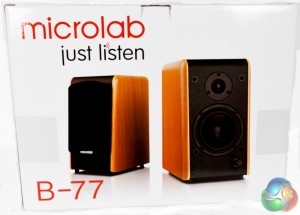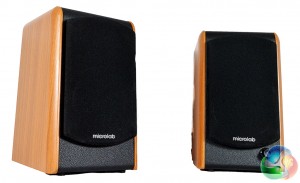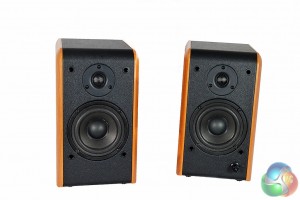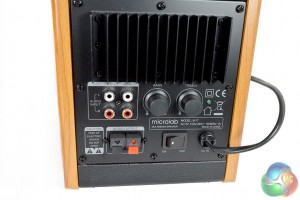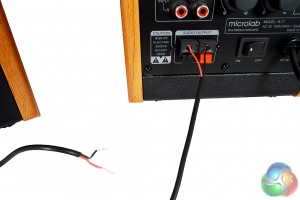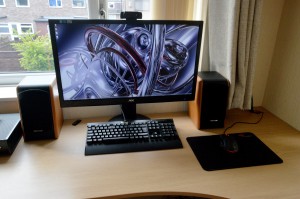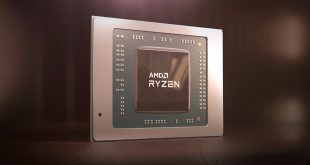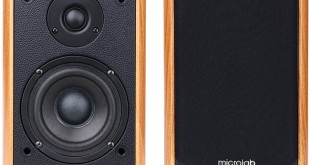
Microlab is back with a new line of speaker systems for 2015. Today we are taking a look at the B-77 bookshelf stereo speakers, making them a bit smaller and more suited for desk use than the giant Solo 8C speakers we reviewed last year.
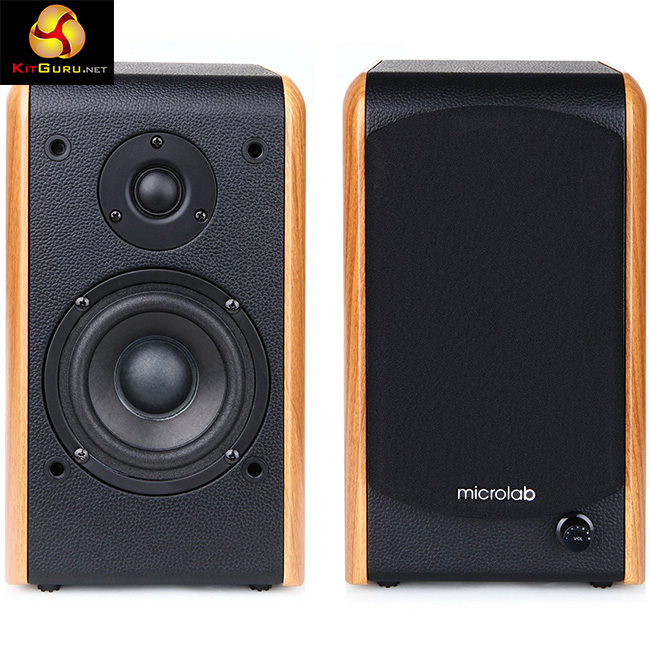
Microlab impressed us greatly last year with the Solo 8C’s, walking away with a ‘MUST HAVE’ award. Will the B-77 speakers be equally impressive? Let’s find out…
Features and Specifications:
- Bookshelf design.
- Wood cabinet for warm tones.
- Bass reflex tunnel for deeper bass.
- Master volume, treble and bass controls.
- Terminal speaker connection.
- Output power: 48 Watt RMS.
- Power distribution: (14+10)x2 Watt.
- Frequency response: 55-20,000 Hz.
- Signal/Noise ratio: 70dB.
As you can see, the Microlab B-77 speakers come in a fairly large, white box. The same picture is shown on the front and back, with some technical specifications listed on the side.
As you can see, the speaker covers are removable.
The speakers are a little bigger than I was initially expecting. In terms of height, they are much smaller than the Solo 8C’s. However, they do have quite a large footprint on the desk. Overall, I like the look, not everyone will want wooden speaker cabinets but they should provide a warmer sound. If you have a light wood desk then they won’t look out-of-place at all.
On the back we can see the variety of connections available. To connect the left and right speakers together, we have a terminal cable, which looks quite frail but works perfectly fine. It has a decent length as well, allowing you to set the two speakers quite far apart.
Aside from that, we also have some standard RCA connections. The cable included allows you to plug the speakers in to any 2.5mm input, so these speakers can be used with any device with a headphone jack.
That concludes our tour of the B-77 speakers, now let’s plug them in and see how they sound…
The Microlab B-77 speakers have been designed for full range audio reproduction with precise audio positioning, which should make them perfect for high quality music tracks. While the speakers do allow you to adjust the EQ a bit with dials for treble and bass, I will be leaving these settings alone for the sake of our tests.
To test the B-77 speakers, I went ahead and used the same method I would use to test a headset. The speakers became a part of my own setup for a couple of weeks, using them to listen to music, watch movies and play games.
When it comes to games, the Microlab B-77 speakers perform well. I play a lot of Counter Strike: Global Offensive, so I was impressed to find that despite the lack of a subwoofer, gunshots and explosions still pack plenty of punch. In addition, there is plenty of volume to play around with so if you wanted it to sound like you were in an actual war zone, you could achieve that pretty easily.
In addition to that, the speakers perform well in games with more ambient noise, like Alien Isolation. You can hear the low hums of the ship as you sit there stranded in space. The creaks and little noises in the surrounding area are also much more noticeable and clear, which helps with immersion.
Listening to music offers a similar experience. Much like when you listen to tracks through a pair of reference monitors, the different layers of the mix are easily discernible. Vocals come across clear and snare hits pack a nice punch. However, I do feel like there is something missing in the low-end. This is particularly noticeable when listening to songs from the likes of A Day to Remember or D.R.U.G.S.
The slightly weak bass response is to be expected as this is a 2.0 speaker system, rather than a 2.1 system, which would come with a subwoofer to help out with the bass. If you push up the bass dial on the rear of the speaker, then you do run the risk of subduing the mid tones and muddying up the sound a bit so there are some compromises to be made.
That said, for a small pair of stereo speakers, Microlab's latest offering performs admirably and considering they can be had for around £60, the few weak points can be forgiven.
Overall, I am impressed with the Microlab B-77 speakers. They perform very well, delivering high volumes of accurate sound in a small package. However, they are not perfect.
The bass response isn't quite as impactful as one would hope and turning up the bass dial on the back of the speaker can result in a muddier sound with subdued mid tones. To be fair, the B-77 speakers lack a dedicated driver for bass- something that can be found on the much larger (and more expensive) Solo 8Cs. In addition, there is no subwoofer either so all things considered, these speakers perform about as well as you could expect.
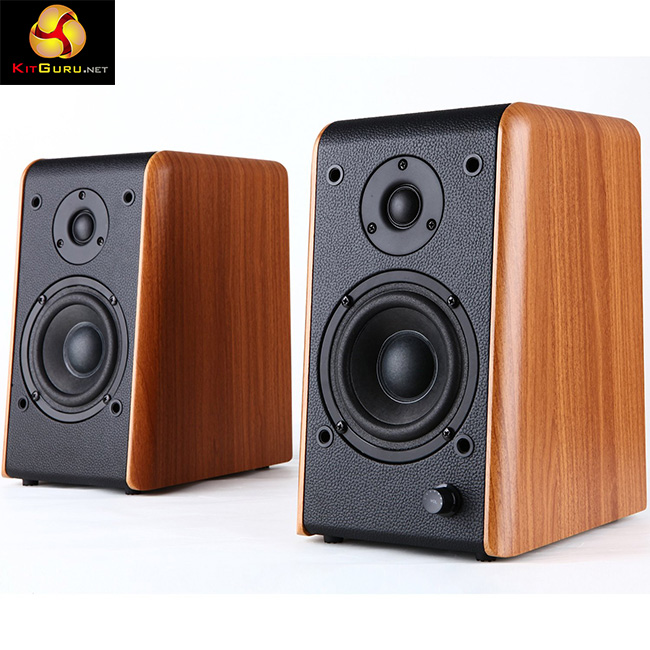
While the B-77 speakers are not the largest I have had on my desk, if space is an issue for you, then you might be better off with a smaller pair of satellite speakers that you could tuck behind your monitor. Logitech has some popular options in its Z-series of speaker systems.
Now pricing and availability can be scarce inside of the UK. Right now some Amazon resellers have them in stock starting at £54.99 and going all the way up to £74.99. Alternatively, Scan has them in stock for £38.84, which I feel is a pretty good price for speakers of this quality.
Discuss on our Facebook page, over HERE.
Pros:
- Decent sound quality.
- Plenty of volume.
- Solid build quality.
Cons:
- Bass and Treble dials are not easily reachable.
- Lacks the bass response that a 2.1 system would provide.
- Will take up quite a bit of desk space.
KitGuru Says: If you can grab them for under £50, then I would say that the Microlab B-77 speakers are worth buying.
 KitGuru KitGuru.net – Tech News | Hardware News | Hardware Reviews | IOS | Mobile | Gaming | Graphics Cards
KitGuru KitGuru.net – Tech News | Hardware News | Hardware Reviews | IOS | Mobile | Gaming | Graphics Cards


